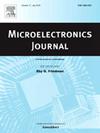Exact and approximate Radix-4 recoding multipliers for high-efficiency computation
IF 1.9
3区 工程技术
Q3 ENGINEERING, ELECTRICAL & ELECTRONIC
引用次数: 0
Abstract
—In this paper, novel exact and approximate encoding methods are proposed to improve the computation efficiency of the Booth multiplier. The proposed encoding methods realize the transformation from non-zero to zero encodings of the radix-4 Booth algorithm, which increases the number of zero encodings. The proposed exact and approximate recoding multiplication algorithms reduce the computing operation of the radix-4 Booth multiplier by skipping zero encodings. Therefore, the multiplier computation time and energy consumption are reduced. Based on these algorithms, an exact radix-4 recoding multiplier (ER4RM) and two approximate radix-4 recoding multipliers (AR4RM1 and AR4RM2) with different accuracies are proposed. The multipliers were synthesized using a standard CMOS 28-nm process and verified using several different digit sets, and the energies are 0.25, 0.24 and 0.23 pJ based on typical 16-bit widths for ER4RM, AR4RM1 and AR4RM2, respectively. The implemented results show a significant energy and energy-area efficiency advantage over existing multiplier designs, with slight accuracy loss.
求助全文
约1分钟内获得全文
求助全文
来源期刊

Microelectronics Journal
工程技术-工程:电子与电气
CiteScore
4.00
自引率
27.30%
发文量
222
审稿时长
43 days
期刊介绍:
Published since 1969, the Microelectronics Journal is an international forum for the dissemination of research and applications of microelectronic systems, circuits, and emerging technologies. Papers published in the Microelectronics Journal have undergone peer review to ensure originality, relevance, and timeliness. The journal thus provides a worldwide, regular, and comprehensive update on microelectronic circuits and systems.
The Microelectronics Journal invites papers describing significant research and applications in all of the areas listed below. Comprehensive review/survey papers covering recent developments will also be considered. The Microelectronics Journal covers circuits and systems. This topic includes but is not limited to: Analog, digital, mixed, and RF circuits and related design methodologies; Logic, architectural, and system level synthesis; Testing, design for testability, built-in self-test; Area, power, and thermal analysis and design; Mixed-domain simulation and design; Embedded systems; Non-von Neumann computing and related technologies and circuits; Design and test of high complexity systems integration; SoC, NoC, SIP, and NIP design and test; 3-D integration design and analysis; Emerging device technologies and circuits, such as FinFETs, SETs, spintronics, SFQ, MTJ, etc.
Application aspects such as signal and image processing including circuits for cryptography, sensors, and actuators including sensor networks, reliability and quality issues, and economic models are also welcome.
 求助内容:
求助内容: 应助结果提醒方式:
应助结果提醒方式:


